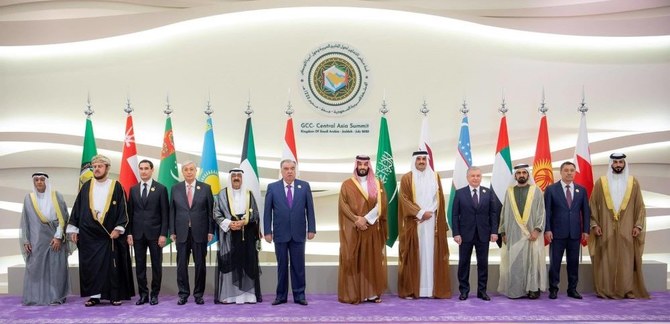
- ARAB NEWS
- 02 May 2024

The Saudi city of Jeddah last week hosted the first summit between the Gulf Cooperation Council states and Central Asian nations. The joint statement issued at the end reflected the importance of moving forward in strengthening the relations between the two sides on the collective and bilateral levels. The statement emphasized the need for joint work to ensure flexibility of supply chains, while improving transportation and communication as well as food, energy and water security. The statement also called for coordination to confront challenges.
In light of the summit, observers have high expectations, suggesting a qualitative transformation in the relations between the two blocs given their significant geographic, economic, cultural and historical bonds.
Over the past three years, I have visited several of the Central Asian nations. A number of research and academic partnerships have been established with universities and institutions specializing in studies on the East and the West.
In light of the growing international competition over the region, there emerges an urgent Saudi need to boost ties with the Central Asian nations — but with tools different from those deployed in the past. During our visits there, we felt the desire by the governments and peoples of these countries to strengthen ties with Saudi Arabia at all levels, as well as their confidence in the Kingdom. Some of these countries are undergoing radical transformations in terms of openness to others and carrying out political, economic and social reforms. In addition, they are promoting a religious middle way and moderation, thus making the relationship more likely to succeed with the Gulf states than with other nations.
I have personally met with several influential people in these states, who all reiterated their nations’ desire to boost ties and open up new avenues of economic and trade cooperation with the Kingdom. Saudi Arabia has started directing investments toward these nations, including Uzbekistan, where its investments have amounted to about SR45 billion ($12 billion) in different sectors. In my viewpoint, there will be bigger investment opportunities in the future, in addition to investments in other Central Asian nations.
Thus, perhaps Saudi businessmen and investment funds need to conduct a serious assessment of these nations’ market trends, as well as the investment climate. Central Asian nations are endowed with fertile agricultural lands and amazing natural scenery, which could make them popular tourist destinations for Saudis. They also possess untapped natural resources due to the poor infrastructure and lack of skilled human resources. Additionally, the Saudi market could be a suitable destination for the agricultural products coming from these nations.
There is a clear desire among the Central Asian nations for a Gulf partnership to construct a railway linking Pakistan and Afghanistan with the countries of the region. This would be faster and easier than the transit corridor that connects Oman and Iran with the countries of Central Asia via Turkmenistan, known as the Ashgabat Agreement. This route is a strategic project for the Gulf.
I think that the security concerns in the region regarding passing through Afghanistan can be overcome in light of the fact that trucks are passing through the country within days and without any significant security challenges. There is also a need to construct a road to facilitate trade between the two blocs.
Two years ago, I attended an international conference in Tashkent, in which the Uzbek president gave a clear explanation, supported by pictures and maps, of the need for connectivity and its importance to the Gulf states, China and Europe.
That conference was before the Taliban seized power in Afghanistan and I tweeted at the time about the rivalry that was present between Afghan President Ashraf Ghani and Pakistani Prime Minister Imran Khan.
There is an urgent Saudi need to boost ties with the Central Asian nations — but with tools different from those deployed in the past.
Dr. Mohammed Al-Sulami
It is a given that the economic and trade trajectory is a conduit for political understandings and reaching harmony in terms of visions and positions. Saudi Arabia’s absence from the cultural landscape in these countries needs serious reconsideration. There is a stereotype about Saudi Arabia historically, culturally and intellectually, which should be addressed in a way that sincerely reflects the reality and dissipates the existing judgments adopted by the Central Asian elite.
Thus, I suggest forming a cultural committee and another economic-commercial committee to visit these countries and hold sessions and workshops involving Saudi intellectuals and businessmen. Saudi cultural days, though modest at the beginning, should also be held, since this would open up significant horizons for the Kingdom and its projects arising from Vision 2030.
Reliance on Saudi soft power, with all its various tools, currently plays a major and vital role in correctly and realistically defining the Kingdom’s capabilities and potential. It also contributes to forging ties with a lot of nations and relations that are based on correct information and a true image, away from distortions and fabrications aimed at defaming the Kingdom’s image, orientations, history and culture.